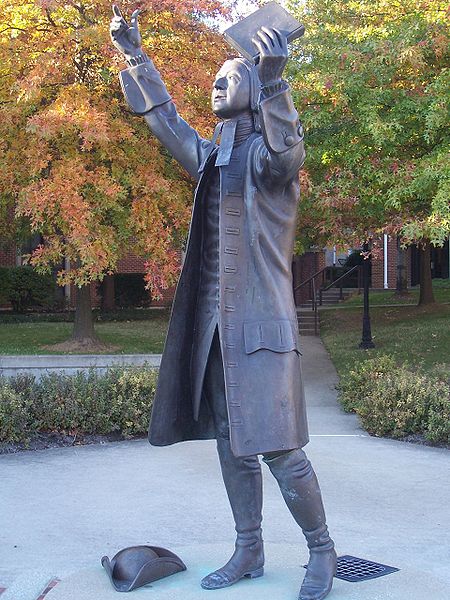When we ran our recent series of posts on work and vocation (linked at the bottom of this post) in Christian history by Faith and Work Channel senior editor and Christian History magazine senior editor Chris Armstrong, we accidentally missed this one. Ooops! Enjoy. If you want to read more of what Wesley had to say in his own words, you can check out our series of posts on Wesley’s sermon “The Use of Money”:
- Business advice from John Wesley
- More business advice from John Wesley
- Even more business advice from John Wesley
While Wesley (1703–1791) claimed that Christians ought to preach repentance often and politics rarely, except when  necessary to defend the king, he was actually not shy about expressing his political and economic opinions. Those opinions were typical of an upper-middle-class, Oxford-educated clergyman, but that did not mean he was unconcerned about the problems of English society.
necessary to defend the king, he was actually not shy about expressing his political and economic opinions. Those opinions were typical of an upper-middle-class, Oxford-educated clergyman, but that did not mean he was unconcerned about the problems of English society.
One of his responses was to issue scathing indictments of those who profited off of others. His tract “Thoughts on the Present Scarcity of Provisions,” for instance, claimed that the poor were hungry because of the influence of “distilling, taxes, and luxury.”
He also tried to help. His book Primitive Physic (1746) was an inexpensive compilation of home remedies for those too poor to pay doctor’s bills. Wesley’s system of organizing his followers into classes and bands within the Methodist “societies” not only discipled them in spiritual growth but also distributed relief funds collected from society members. He established a medical clinic and maintained the dispensary himself, although it eventually had to close for lack of funds. He founded tuition-free schools for poor children, one in his own home. Under his direction the Foundry Chapel in London administered a revolving loan fund that served over 200 people a year. And he also founded a house for widows and orphans and regularly ate his meals with them.
In short, Wesley taught not only personal holiness, but also, quite centrally, social holiness. In examining the motives behind John Wesley’s extraordinary lifelong dedication toward bringing material as well as spiritual flourishing to the poor, Duke’s Richard Heitzenrater argues that it comes from a Christian virtue ethic. For Wesley, ethical behavior in the workplace, for example, came not from an ethic of obligation—gritting your teeth and performing a series of duties. It came from a changed heart. Only a changed heart could restore the individual dignity of human beings created in the image of God. And only the restoration of individual lives could finally restore society. In other words, Wesley’s theology of human dignity and virtue laid a firm Christian foundation for economic virtue.
In addressing the needs of the poor, Wesley did not rail against capitalism, though he did preach against its abuses. The best way to flourish economically and socially was not to change an economic system, but rather to put all else second to the Gospel, and let the transformation of our hearts that the Gospel brings influence every other area of our lives and work. He did recognize that very few people reached what he called “entire sanctification” or “perfect love,” in which all their impulses and desires were shaped by that central desire for God. But he insisted that the truly Christian person was also a flourishing person – someone largely happy and content in all his or her ways. Seek first the kingdom of God, and all these other things – our worldly lives, our work – will follow after in their proper order.
Though this might seem an individualistic creed, it was not. First, Wesley established brilliant organizational forms to nurture Christians in both personal and social holiness: the societies, the classes, the bands, the annual conferences. Think of the class meetings, for example, in which one confessed one’s deepest struggles in a close circle of people. This came from a great insight into our nature as communal beings—an insight that even as recently as the 1960s, secular Americans were trying to recapture in their encounter group therapies and their communes. The truth is, you need communal forms if you are to become a better person—you need to be open to the edifying and challenging words of others, to being sharpened as iron sharpens iron. Wesley brought organizational genius to his movement.
And he applied that genius to the betterment of the world and the adding of value to communities through many economic means. Like his network of entrepreneurial dispensaries – essentially drug stores – that he founded in order to provide the necessary medicines for poor folks, or his multimillion dollar publishing operations, which left him with huge amounts of money that he had to figure out how to give to the poor.
This post originally appeared at Grateful to the Dead.
Previous posts in this series:
- Getting the beginning and end of the story right
- We were made to work
- Jesus the incarnate worker God’
- A brass-tacks, real-world theology of work and vocation
- Early Christianity and everyday work
- The contemplative contribution
- Luther on ordinary work and vocation
- Calvinists, Puritans, and the Wesleyan response
- How and why Methodists moved the market economy forward
- God’s beer mogul
- If God really does work through our work, then what do we do about that?
- Pastors and lay leaders: I hate my job
- Let’s get practical: faith-and-work pointers for pastors and lay leaders
- How do we understand our work in the light of our faith?
- Next steps and resources for church leaders
Image: Statue of John Wesley at Asbury Theological Seminary, photographed by Adam Davenport, sourced via Wikipedia.












